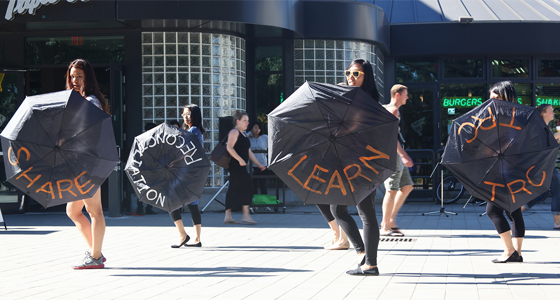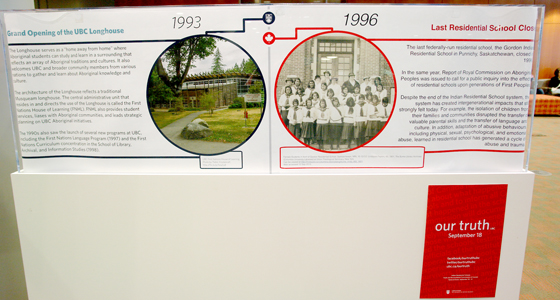
On September 11, in an effort to raise awareness of the TRC, CTLT staff and students participated in a flash mob performance.
To recognize Canadian history and the intergenerational effects of Indian Residential Schools, the Truth and Reconciliation Commission of Canada (TRC) held its West Coast National Event in Vancouver, at the Pacific National Exhibition (PNE), from September 18-21, 2013. UBC took the extraordinary step of suspending almost all classes on its Vancouver campus on September 18 to give students, faculty, and other members of the UBC community the opportunity to more fully engage and participate in the historic Truth and Reconciliation Commission of Canada National Event.
This year, the City of Vancouver proclaimed June 21, 2013 – June 20, 2014 as the Year of Reconciliation in an effort to acknowledge the Indian Residential School experience and its impact on Aboriginal communities. The TRC was established in 2008 by the Indian Residential Schools Settlement Agreement in order to gather testimony and records surrounding the Indian Residential School system that operated in Canada from 1875-1996. The Commission’s five year mandate is to learn the truth about what happened in the residential schools that were created for Aboriginal children, and to further educate and inform Canadians about the history and effects of the Indian Residential School system. Generations of Aboriginal children were sent to these schools to be stripped of their Aboriginal language, cultural identity, and traditions. Many suffered significant abuse and many died at residential school.
On September 18, the Centre for Teaching, Learning and Technology (CTLT) partnered with other UBC units to host a full day of programming at the First Nations Longhouse. Sessions were live streamed from the PNE, and there were a number of presentations from groups across campus, sharing how they are engaging with initiatives to support a further understanding of Indian Residential Schools as well as information related to the TRC event. CTLT also partnered with the Longhouse to put on an exhibit which shares stories about the Inuit peoples and their experiences in residential schools.
Over the summer, CTLT worked with a number of different faculty, staff, and student groups to raise awareness about Indian Residential Schools and the TRC, and to help them engage with the TRC in a meaningful way. For example, CTLT was able to incorporate information about Indian Residential Schools and the TRC into its TA Training programs. By hosting events, opening up discussions, and creating resources, CTLT was able to engage with a variety of campus and community partners. One such event, Incorporating Truth and Reconciliation Commission (TRC) Resources into Your Teaching and Learning, provided faculty and staff with an opportunity to connect with educational resources that could be integrated and contextualized into their courses.
Amy Perreault, CTLT’s Strategist, Aboriginal Initiatives, notes that with the momentum around the TRC, as well as UBC-led initiatives to enhance teaching and learning about Indian Residential Schools, “CTLT was able to engage with multiple units on and off of campus that we haven’t engaged with before.” For example, CTLT staff spoke about the TRC to over 1,000 new international and Aboriginal students during the Jump Start orientation. CTLT also worked with student peer programs and staff members at Enrolment Services to discuss how they could engage with the TRC. In addition, CTLT partnered with many different faculties across campus to support educational projects and create engagement opportunities with the TRC. For example, CTLT worked with the Faculty of Forestry to create a video that seeks to make connections between Forestry, as a field of study and as an industry, and the TRC. This video was shared with all faculty, staff, and students in the Faculty of Forestry, to encourage them to engage with the TRC and to learn more about Indian Residential Schools.
CTLT has also worked with various units across campus to put together events, exhibits, and presentations throughout the month of September. Throughout, CTLT has worked very closely with the First Nations Longhouse and X̱wi7x̱wa Library. As the point of contact for faculty, staff, and students to learn about Aboriginal initiatives, the First Nations Longhouse and X̱wi7x̱wa Library have a number of resources available for members of the UBC community to learn more about Indian Residential Schools and the TRC.
In mid-September, CTLT partnered with UBC Robson Square and the UBC Learning Exchange to host two exhibits: the Berger Inquiry at Robson Square and Generations at the Learning Exchange. CTLT also partnered with Green College and St John’s College to organize film nights in the colleges using “A Sorry State” by Mitch Miyagawa and the 8th Fire series by the CBC.
On September 22, a number of CTLT staff members and others in the UBC community participated in the Walk for Reconciliation. As the final event of Reconciliation Week Vancouver 2013, the Walk for Reconciliation brought together approximately 70,000 people and shows a commitment to transforming the relationship among Aboriginal peoples and all Canadians.

The Aboriginal timeline project display case in the Irving K. Barber Learning Centre.
On display until the end of October, CTLT and the Irving K. Barber Learning Centre (IKBLC) have partnered to host an exhibit, Our Truth: Truth and Reconciliation at UBC, in the display cases on the second floor of IKBLC. The display features a number of different exhibits from around campus, including information about language revitalization work by the Musqueam Nation and the UBC First Nations Language Program, photographs from the exhibition Speaking to Memory: Images and Voices from St. Michael’s Indian Residential School, taken by a student and her classmates, and an Aboriginal timeline project. The timeline exhibit highlights key moments in Aboriginal history, and aligns them with key moments at UBC. CTLT will be launching a separate, but related timeline website later on in the fall. The website will provide a more comprehensive historical timeline, and will have in-depth resources and guides that can be used to continue the conversations beyond September’s events.
In an effort to encourage UBC community members to further engage with the TRC and Indian Residential Schools, a variety of teaching and learning resources are available on the Indian Residential School Initiative website. CTLT has created a number of useful resource guides for faculty members in order to help them engage with the TRC in their classes. There is also a continuum of learning, which encourages individuals to continually engage with the TRC and learn more about Aboriginal issues.
Additional resources include the Indigenous Foundations website, which provides information on key topics that relate to the Aboriginal peoples of Canada, their culture, and their history. Another website, What I learned in Class Today, explores difficult classroom discussions surrounding Aboriginal and other socially contentious issues, and works to improve the conversations around politically and culturally sensitive topics in the classroom.
As the Year of Reconciliation progresses, faculty, students, and staff are encouraged to continue to engage with and learn more, not only about the TRC and the history of Indian Residential Schools, but also the wide array of Indigenous communities, topics, and issues we as Canadians have long been denied adequate information about. Furthering our understanding of these topics and issues is a crucial and necessary step towards continued healing and reconciliation. A number of events will continue to run throughout the year, including an exhibit at the Belkin Art Gallery and an exhibit at the Museum of Anthropology. CTLT’s Classroom Climate Series, which runs throughout the year, encourages members of the UBC community to challenge their own assumptions about what they have learned about Aboriginal people, become more critically aware of their teaching and research practices, and learn more about how they engage with topics that challenge their own social location within the institution. An educational film series regarding the house names in use at Totem Park Residence is also being produced. The film series includes members of each of the Indigenous communities the house names were intended to honour when named. Graduate Academic Assistant for Aboriginal Initiatives at CTLT, Sarah Ling, talks about the process of creating this project in this article.
More information about Indian Residential Schools and the TRC can be found on the Indian Residential School Initiative website.
This article was published in the September 2013 CTLT Newsletter, Dialogues. Below is a list of the articles included in the issue:
- Truth and Reconciliation at UBC: Learning About the Past and Present to Transform the Future (currently viewing)
- Celebrate Learning at UBC!
- UBC Course Offerings Feature Students as Producers of Content
- Update on Connect Issues
Find out more information about the CTLT Newsletter, Dialogues.

